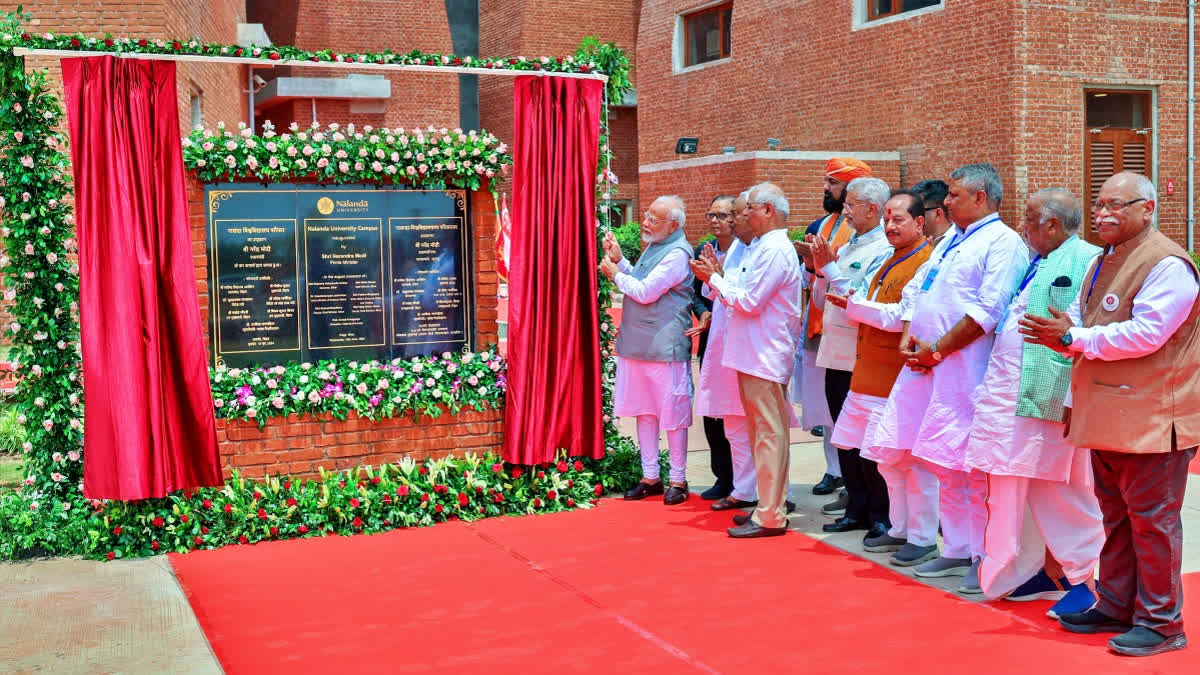New Delhi: The inauguration of the new campus of the Nalanda University in Bihar on Wednesday by Prime Minister Narendra Modi is yet another manifestation of New Delhi’s foreign policy of leveraging soft power to project India as a major power in the world.
Inaugurating the new campus at Rajgir in Bihar, Modi said that the development of education leads to the deepening of the roots of the economy and culture. This is borne out by the global experience and experience of the developed countries.
“India that is working on its goal of becoming a developed nation by 2047 is transforming its education system,” he said. “My mission is that India becomes the centre of education and knowledge for the world. My mission is that India should again be recognised as the most prominent knowledge centre of the world.”
Speaking on the occasion, External Affairs Minister S Jaishankar said that the inauguration of the new campus is a revival of a global bridge of learning that can build relationships even further than in the past.
“Education, training and capacity building are the most effective ways of promoting international understanding,” Jaishankar said. “This is a particular commitment that we all must have towards the Global South.”
During its recent presidency of the G20 intergovernmental forum, India has been projecting itself as the voice of the Global South. During the G20 Summit held in New Delhi in September last year, India took the initiative to bring the African Union on board the intergovernmental forum that earlier comprised 19 sovereign nations and the European Union that works to address major issues related to the global economy, such as international financial stability, climate change mitigation and sustainable development. African countries comprise the majority of the countries of the Global South.
Jaishankar said that the inauguration of the new Nalanda University campus also marks the realisation of a longstanding commitment by India to the East Asia Summit grouping.
“It reflects the seriousness with which we pursue our Act East policy,” he said. “But most of all, it underlines Bharat’s endeavour to emerge as a Vishwa Bandhu, extending the hands of friendship and cooperation to the international community. By doing so, we contribute to the rejuvenation of civilisational linkages, to the celebration of our shared cultural heritage and to the appreciation of the immense diversity of our existence.”
The modern Nalanda University is conceived as a collaboration between India and East Asia Summit (EAS) countries. Designated as an Institute of National Importance (INI) and excellence, it is the flagship project of the Ministry of External Affairs of the Government of India and the successor of the famed Nalanda monastery located in the same city. Several eminent people, including the heads of mission of 17 countries, attended the inauguration ceremony.
In a message on X, Chinese Ambassador to India Xu Feihong stated: “Congratulations on the inauguration of the new campus of Nalanda University, which is an important fruit of the East Asia Summit! Wish it greatly promote cultural exchanges in this region.”
That is what matters. A country cannot project itself as a major power by flexing its economic and military powers alone. India is the world’s fastest-growing major economy and a rising player in geopolitics. India is a member of the major international organisations like the G20, BRICS (Brazil, Russia, India, China, South Africa, and the Quad, also comprising the US, Japan and Australia which is working for a free and open Indo-Pacific in the face of China’s hegemony in the region.
Since the Modi government came to power at the Centre in 2014, New Delhi has been leveraging soft power diplomacy to ensure India’s acceptability as a major power in the world. India’s rich and diverse cultural heritage, encompassing languages, religions, arts, and traditions, forms the cornerstone of its soft power. The promotion of Indian culture abroad is facilitated through festivals, cultural events, and exhibitions showcasing Indian dance, music, cinema, and cuisine.
Yoga and Ayurveda are significant components of India’s cultural diplomacy. The International Day of Yoga, celebrated annually on June 21, has become a global event since its inception in 2015. This initiative, endorsed by the United Nations, underscores India’s cultural influence. Ayurveda, with its holistic approach to health, is gaining international recognition, further enhancing India’s soft power.
In the education sector, India offers various scholarships and exchange programmes to students from developing countries, particularly in Africa and Asia. Programmes like the Indian Technical and Economic Cooperation (ITEC) and the Indian Council for Cultural Relations (ICCR) Scholarships strengthen educational and cultural ties, promoting goodwill towards India.
The opening of Nalanda University has further broadened India’s leveraging of its soft power in the education sector. “By reviving the Nalanda University that had attracted people from countries in East Asia, New Delhi is trying to reposition India in the field of culture and education,” K Yhome, Fellow at the Shillong-based Asian Confluence think tank, told ETV Bharat.
“Though India is rising economically, politically and militarily, it is also important to project its soft power,” Yhome said. “It is soft power that attracts people from across the world. The Nalanda Universiy has emerged as an important international centre of learning.”
In this connection, he mentioned the US educational system that attracts people from all corners of the globe and the popularity of Hollywood movies. “Unless you produce educational hubs that attract people from different countries, you cannot project yourself as a major power,” he said. In this connection, he pointed out how Modi interacts with the Indian diaspora and visits cultural sites with Indian linkages during his trips abroad.
“The Modi government is trying to revive historical and civilisational linkages with other countries,” Yhome said. “The Nalanda University fits very well with the current foreign policy.”
Read More



